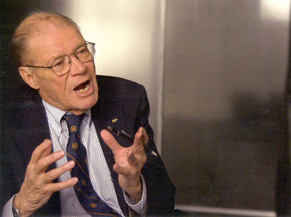Hidden Gems - Fog of War: Eleven Lessons from the Life of Robert S. McNamara
By Walid Habboub
November 30, 2004
The subject of The Fog of War, former Secretary of Defense Robert S. McNamara, is one of the most interesting characters to ever be featured in a documentary. The entire film basically boils down to a character study of the secretive and policy-changing man who was occupied a high and influential rank within the White House during the Vietnam War. Director Errol Morris takes us through the America of McNamara’s childhood and into his key role in America’s involvement in Vietnam. By doing this, Morris, through the eyes of one man, captures how America survived its greatest challenge, sleepwalked through its golden age and slowly lost track of the ideology that helped create it.
Born in 1916 in San Francisco, McNamara became an instructor at Harvard University, his alma mater. McNamara then went on to serve in World War II and returned to citizen life in 1946. His keen intellect and logical approach to problem solving helped him become the first ever non-Ford family member to become the President of Ford Motor Company after he had helped raise the company from the ashes. After serving only five weeks as president of the auto maker, McNamara was approached by then-President John F. Kennedy to be his Secretary of the Treasury, which he declined. Instead, McNamara became Kennedy’s Secretary of Defense and helped guide Kennedy through the Cuban Missile Crisis. After Kennedy’s assassination, McNamara worked under Lyndon B. Johnson and was once again instrumental in shaping policy about America’s involvement in Vietnam. For all the potential secrecy that should come with a man of such a past, The Fog of War presents a quite candid man who is both fascinating and repulsive at once.
The documentary completely relies on McNamara and his life does not disappoint. The man is worthy of an entire series of documentaries, but Morris focuses specifically on things in McNamara’s life that he obviously has doubts about, if not out and out regrets. The film is split into 11 different lessons that McNamara has learned and wishes to convey to anyone who is interested. It is McNamara’s lamenting of past actions that fuels the story and makes its subject ever so human. You can see in McNamara’s eyes and hear in his words how genuine he is during the interviews. Though he stops short of apologizing, he does somewhat take accountability for the actions of the government he served and continually points out the inconsistencies and tragedies set forth by policies of the times. Some policies, such as those undertaken in Japan during World War II, were less influenced by him than others. Nonetheless, McNamara does not hold back on his hindsight views. They are presented effectively because the method of delivering the message is so powerful.
It is important to understand that this film does not make value judgments about specific wars or war in general. Morris does not try to paint McNamara as a villain or some form of Orwellian mastermind. Morris lets his subject become the story. What takes center stage here is the lessons McNamara has learned and how a man of his insight is affected by war. In the course of McNamara’s teaching, we become witness to his frailties, his insecurities and his obvious failings. The film does not attempt to make a statement but is simply a complex and honest character study. Whatever emotion and ideologies arise from the interview with McNamara, whether his or the viewer’s, are genuine by-products of the subject matter.
The Fog of War absolutely begs for a follow up. There are so many aspects of McNamara’s life left untouched that you feel that this 90-minute film does not do him justice. Regardless of all the many historical figures that McNamara had insight to, there are still scary areas that McNamara refuses to delve into. It is difficult to believe that a man of McNamara’s history has learned only 11 lessons in his life but you get the feeling that the only reason the film stops where it does is that McNamara is not able to face his demons. While he continues to be of strong character, McNamara comes off sympathetic despite his past and whatever the viewer might think of him. This is why The Fog of War is so powerful. It shows that a man is not defined by his achievement but by how those achievements shape him.




